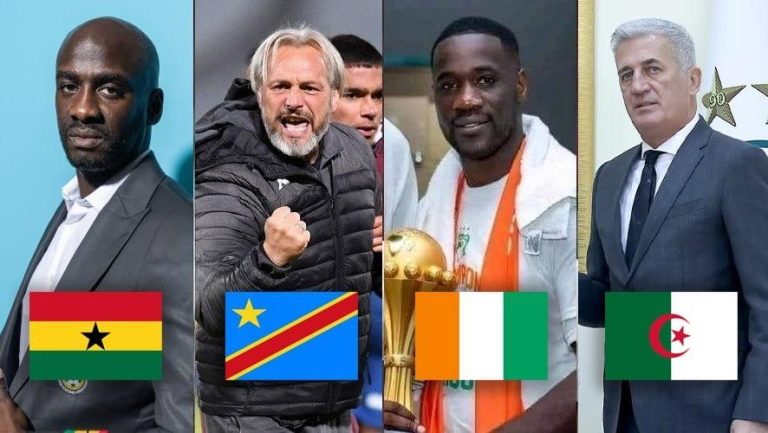Home » Highest Paid African Coaches: Insights Into Salaries and Football Investments in 2024

Highest Paid African Coaches: Insights Into Salaries and Football Investments in 2024
National football coaches in Africa salaries reflect both the financial differences across federations and the continent’s growing sport investment. While some countries can afford to pay big salaries for elite coaching ability, others run within tighter budgets. The highest paid African coaches, their income, and the larger background of these pay scales are examined in this article.
Vladimir Petkovic: Africa’s Highest Paid Coach
Vladimir Petkovic, head coach of the national Algerian squad, leads the pack. The 61-year-old Swiss tactician is the most paid coach on the continent, with €135,000 a month. Although small in comparison to European coaching salaries, this amount is extraordinary by African norms. Petkovic is a great benefit for Algeria because of his performance with the Swiss national team and track record of success.
Petkovic’s selection highlights Algeria’s ambition of ruling African and worldwide football. His salary not only shows his experience but also Algeria’s dedication to support outstanding coaching ability.
Highest Paid African Coaches: Top 10
African football federations have recognized the importance of skilled coaching to achieve success on the global stage. Here’s a breakdown of the top 10 highest paid coaches in Africa:
- Vladimir Petkovic (Algeria) – €135,000/month
- Hugo Broos (South Africa) – €75,000/month
- Emerse Faé (Ivory Coast) – €75,000/month
- Walid Regragui (Morocco) – €70,000/month
- James Kwesi Appiah (Sudan) – €48,000/month
- Otto Addo (Ghana) – €45,300/month
- Marc Brys (Cameroon) – €44,000/month
- Hossam Hassan (Egypt) – €30,000/month
- Tom Saintfiet (Mali) – €20,000/month
- Amir Abdou (Mauritania) – €20,000/month
Insights Into African Coach Salaries
- The Influence of Financial Resources
Petkovic’s pay (€135,000/month) and those of coaches such as Amir Abdou (€20,000/month) show the clear financial differences among African football federations. While less wealthy countries provide top priority on cost-effective techniques, wealthier countries like Algeria and South Africa have more finances to invest in coaching ability.
- Foreign vs. Local Coaches
Because of their international experience and supposed knowledge, foreign coaches can make much more than their local colleagues. Petkovic’s €135,000/month salary, for example, highlights his preference for international talent in various federations since it surpasses most local coaches’ income.
- Performance Drives Pay
Salaries often correspond to expectations. Emerse Faé’s salary (€75,000/month) reflects his success as coach of Côte d’Ivoire, the reigning African champions. Federations are willing to invest in coaches who can deliver results, whether through continental titles or qualification for global tournaments.
What These Salaries Mean for African Football
- Growing Investments
The willingness to pay competitive salaries indicates a shift in priorities for African football federations. High-profile coaches are seen as critical to achieving success on the international stage, and federations are allocating resources accordingly.
- Balancing Ambition and Sustainability
Although rich contracts show ambition, they can also strain budgets, especially in nations where public money is utilized to finance football. This led to discussions about the viability of such expenditures, particularly in relation to urgent social and financial demands.
- Building a Competitive Edge
Lucrative salaries for coaches such as Petkovic are meant to guarantee a competitive edge in competitions. Algeria’s choice to invest thoroughly in coaching shows its aim to not only rule African tournaments but also shine internationally.
Highest Paid African Coaches: Challenges and Opportunities
- Reducing Salary Disparities
The great disparity between the top earners and those at the bottom emphasizes the need of fair financial policies. Developing countries have to look at creative methods to help football grow without depending too much on government money.
- Empowering Local Coaches
African federations could benefit from investing in the development of local coaching talent. Training programs and leadership opportunities for local coaches can create a sustainable pipeline of skilled professionals who understand the unique dynamics of African football.
What These Salaries Reveal About African Football
The salaries of Africa’s national football coaches shed light on the continent’s evolving football landscape. While high earners like Vladimir Petkovic exemplify the growing emphasis on securing world-class talent, the disparities in pay highlight the challenges faced by smaller federations.
As African football continues to rise in prominence, the focus will likely shift toward balancing ambition with sustainability. The investment in top-tier coaches is a promising sign of progress, but the ultimate goal remains achieving success while fostering equitable growth across all levels of the sport.
